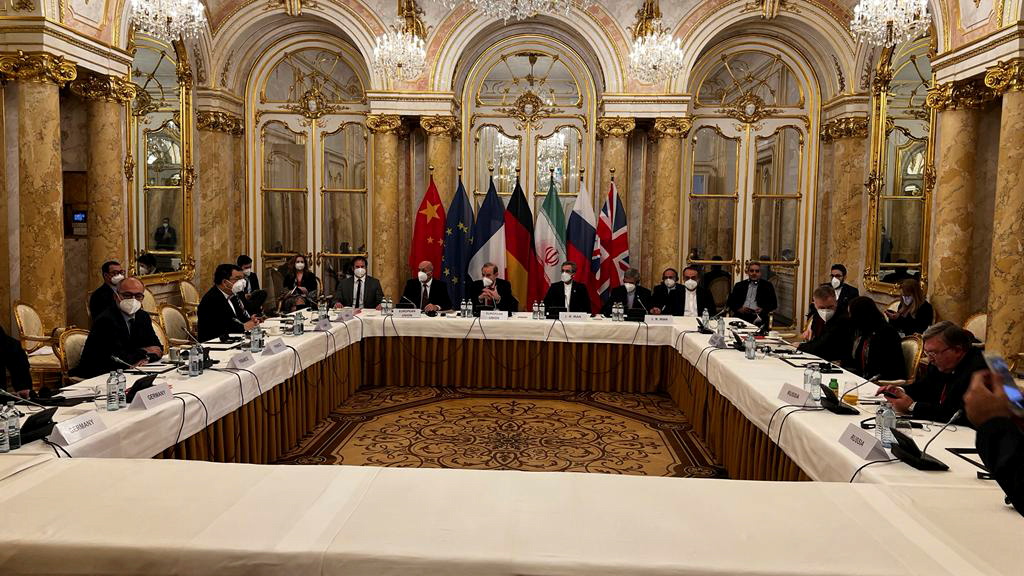Tehran
- Nearly two months after the parties to the nuclear negotiations in Vienna confirmed that reaching an agreement was imminent, the European Union's foreign and security policy chief Josep Borrell announced on Friday the suspension of negotiations "due to external factors."
For its part, the Iranian Foreign Ministry announced - in response to the suspension of talks - that any external factor will not affect the joint desire to reach an agreement.
And Foreign Ministry spokesman Saeed Khatibzadeh wrote - in a tweet on Twitter - that the suspension of talks may constitute a motive for resolving any remaining issue and the final return to the 2015 agreement.
After the announcement of the suspension of negotiations, the Iranians turned their attention to Russia, the northern neighbor, as the most prominent "external factors" that impeded the signing of "the final text, which is almost ready and on the table," according to Borrell.
US piracy and the confiscation of 2 ships with Iranian oil cargo, remaining "terrorist" designations, new US demands as well as the US failure to remove more companies, businesses and individuals from the "maximum pressure" sanctions regime are key problems that must be resolved.
https://t.co/oL6ODffuw4
— Seyed Mohammad Marandi (@s_m_marandi) March 11, 2022
The Russian-American-Iranian triad
In this context, Professor of International Relations at Tehran University, Mohsen Jaliland, classifies the Russian demands as the largest part in the triad of main factors that temporarily froze the negotiations. He added, “Almost all of the parties to the nuclear agreement signed in 2015 have demands that were not announced in the media, but the harsh sanctions that were imposed Recently, Russia brought Moscow's demands out into the open."
Russian Foreign Minister Sergei Lavrov had called for US guarantees that Western sanctions imposed on Moscow would not affect its cooperation with Tehran in the framework of the nuclear deal.
Gilliund revealed, in an interview with Al Jazeera Net, about Iranian demands that were presented again during the visit of the chief Iranian negotiator Ali Bagheri Kani to Vienna, adding that Tehran's demands focus on the need for the American side to lift the economic sanctions that fall under the mantle of CAATSA, a law Fight against America's enemies with sanctions.
The third external factor is due to the United States and its failure to provide transparent guarantees regarding the lifting of sanctions on Iranian oil exports, according to Gilliund, who also revealed oral American guarantees regardless of Iranian oil exports, especially after the Ukrainian crisis.
important secondary factors
The professor of international relations at the University of Tehran believes that the announcement of the United States' seizure of two Iranian oil shipments negatively contributed to the suspension of negotiations, explaining that Washington wants to use economic sanctions as a stick to punish Tehran wherever it wants, and this justifies Iran's insistence on lifting economic sanctions in a transparent manner coupled with guarantees.
As usual, the Iranians are looking for the Israeli entity wherever a problem occurs that harms their national interests.
Gilliund sees Prime Minister Naftali Bennett's visit to Russia, coinciding with the recent Israeli attack on Iranian targets in the Damascus countryside, as coordinating between Tel Aviv and Moscow.
He concluded that the prolongation of the Vienna negotiations opens the door to presenting demands by the participating parties, such as Russia, and concluded by saying that direct talks between Iran and the United States have proven their worth in resolving outstanding issues, as culminated in 2015 with the signing of the nuclear agreement.
Harmful beneficial Lord
Despite the impact of the Russian condition on the faltering of the Vienna negotiations, a segment of Iranians understands the demands of the Russian ally from the United States and the European Troika, stressing that there is no Russian pressure on Tehran in the negotiations aimed at reviving the nuclear agreement.
In this context, the Iranian researcher in international affairs, Hanif Ghafari, says that the nuclear agreement constitutes an independent variable for Iran and is not dependent on regional and international developments, explaining that the Russian demands are aimed at balancing forces in its dispute with NATO and the war in Ukraine.
In his speech to Al-Jazeera Net, Ghafari believes that the US and European policy and their coordination with the International Atomic Energy Agency to pressure Iran in its nuclear file are the most prominent external factors that led to the suspension of the Vienna negotiations.
He added that the Western procrastination in meeting Iranian demands, especially lifting all sanctions and providing guarantees, in addition to Western demands aimed at restricting the nuclear program more and more, almost derailed the negotiations and lost their importance, which led to the complexity of the negotiations and the decline in enthusiasm for their success.
He described the talk about the readiness of the draft agreement as falling within the framework of Western media campaigns and psychological operations, and explained that Tehran, as a major party in the negotiations, denies solving some thorny issues with the American side.
Issues still pending
Ghafari expressed his hope that the suspension of the Vienna negotiations would be an impetus to resolve the issues that are still pending.
He concluded that holding Russia entirely responsible for suspending the negotiations is illogical, and the Western side would have been better off asking why these negotiations, which began about a year ago, were prolonged, as he put it.
And from Vienna, the adviser to the Iranian negotiating delegation, Muhammad Marandi, commented on the suspension of negotiations and wrote on Twitter that “American piracy and confiscation of two Iranian oil shipping vessels, the survival of terrorist regulations, and new American demands, as well as the failure to remove most companies and individuals from the American sanctions regime, these are basic problems that must be processed".

